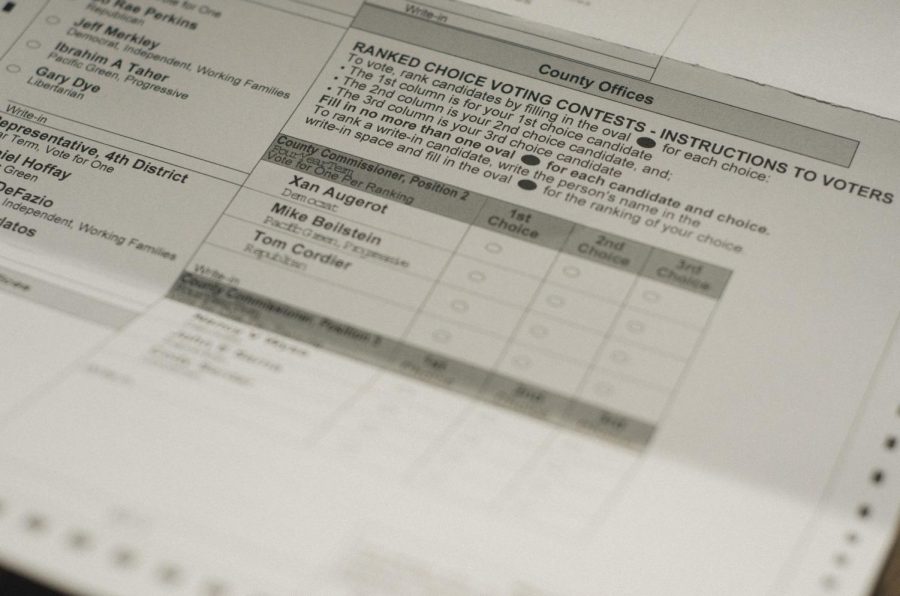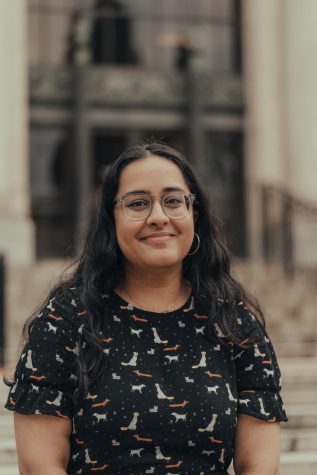Benton County becomes first Oregon county to adopt ranked-choice voting ahead of county election
October 24, 2020
Editor’s Note: This story is a part of the 2020 Elections Issue. The Baro has put together this issue to inform the Oregon State University and greater Corvallis, Ore. communities about the 2020 Elections. This issue will dispel voting myths and include information on local elections, voting methods and tips, candidate profiles, and more.
In a historic upcoming election, Benton County will become the first one in Oregon to use ranked-choice voting to determine two county commission seats on Nov. 3.
Maria Perez, co-director of Democracy Rising said in an email when voters receive their ballot, they can rank the candidates running for a race in order of preference, instead of picking just one.
Voters may rank the candidate they favor most as their first choice, but in case that candidate doesn’t have enough popular support to win, voters can identify back up choices as their second and third preferences on the ballot. If a voter’s favorite does not end up becoming a viable candidate, they are eliminated, and the voter’s next choice automatically counts for their vote.
“With RCV you have more power as a voter, because your vote will not be wasted even if your favorite candidate is out of the race,” Perez said.
Blair Bobier is secretary of Oregon Ranked Choice Voting Advocates, a non-partisan, non-profit organization led by President Dan Rayfield, who is a state representative. In 2016, Bobier, along with Rep. Rayfield, were the chief petitioners who put ballot measure 2-100 on the ballot in Benton County to establish RCV for county elections.
“Our election system is broken and dysfunctional,” Bobier said via email. “Elections are dominated by negative ads and big money. The voices of most people are left out of elections and shut out of government.”
According to Bobier, RCV changes this by bringing more voices into elections and by giving voters more power and choices, adding that places that use RCV have also seen campaigns become more civil and cooperative and less negative. RCV has also brought more diversity to government where it’s been used, Bobier said—places like San Francisco and Oakland, California, as well as Minneapolis, Minnisota.
“One of the problems RCV addresses is plurality winners—candidates who win elections with less than a majority,” Bobier said.
He added that Oregon’s primary is a great example of this. The Democratic primary for Secretary of State was won by a candidate with 36% of the vote. Both the Republican and Democratic primaries for the 2nd Congressional District had candidates winning with about 32% of the vote. The second-place finisher in that race on the Democratic side had 31%.
“How do we know that the person who won had the support of a majority of voters? With our current system, we don’t,” Bobier said. “With ranked-choice voting, we would.”
Bobier noted that there are no real disadvantages to RCV.
“Like anything new, it might take some getting used to and there is often an initial investment to modify voting tabulators and educate the public about the switch,” Bobier said. “In some places, where RCV is used to replace two-round runoff elections, it can save money. That’s what happened in San Francisco.”
RCV allows voters to follow their conscience when voting, without the fear of ‘wasting’ their vote or playing spoiler, and the ultimate winner of the election is someone who has broad, majority support, according to Robin Ye. Ye is a policy consultant with More Equitable Democracy, working to build the coalition for RCV in Oregon.
“RCV is in Benton County because the people wanted it and voted to modernize their elections,” Ye said. “Democracy functions on majority opinions winning, and our elected officials need to be voted in by a majority of the people, not a plurality system where someone can get elected despite a majority of voters voting for someone else other than the ‘winner’. This type of plurality voting system—also known as first-past-the-post voting—used to be in place, and is still in place across Oregon.”
Voters in Benton County also didn’t want to be penalized for having more than just two choices on their ballot, Ye said. With more choices, there are more ways for your vote to lead to a better democracy.
“Instead of our current elections, which feel zero-sum and can incentivize being negative and discourage people from participating, RCV brings more voices and greater diversity to government,” Ye said. “RCV increases voter participation, encourages coalition-building and rewards positive, issue-focused campaigning. This isn’t a new or niche idea either. This election, over ten million voters will be using RCV in the United States, and places that have RCV love it.”
According to Ye, instilling belief that our democracy can be responsive to what the people want is far more important than any argument about tradition or reluctance to change the status quo. The cost of inaction for reforming our elections is too great, he said.
“As a young person myself, I think students and younger folks understand we make voting in this country way too hard, and oftentimes the choices presented don’t inspire participating either,” Ye said. “RCV is a bold change that I truly think can bring back faith in our system.”
The RCV reform movement is gaining a lot of support all over the country, Perez said. In the past few years, over 20 jurisdictions have adopted or implemented RCV, including this past primary season, where the Democratic Party of Wyoming, Kansas, Hawaii and Arkansas used an RCV ballot for their primaries. New York City voters also approved the use of RCV for their municipal elections and will be implementing it for their 2021 election, where they will be electing a new mayor and many city councilors.
In an RCV election, candidates in the running will often need second and third choice votes to actually win a seat and because of this, are incentivized to talk to all voters, even those who support another candidate as their favorite, Perez said.
“This also means that candidates are disincentivized to launch negative attacks on their opponents, as it is unlikely that a voter will give you her second-choice vote if you have just disparaged her favorite candidate,” Perez explained. “This results in the public getting a lot more exposure to candidates and their platforms, and voters feeling empowered to actually vote their conscience, knowing that their vote will not be wasted. When people feel that what they are doing matters, they engage. We need civic engagement in our communities.”
The Oregon Ranked Choice Voting Advocate website and the Fair Vote website contain information about RCV. Benton County created the Benton’s Better Ballot website to educate voters about the implementation of RCV in the upcoming council election.




















































































![Newspaper clipping from February 25, 1970 in the Daily Barometer showing an article written by Bob Allen, past Barometer Editor. This article was written to spotlight both the student body’s lack of participation with student government at the time in conjunction with their class representatives response. [It’s important to note ASOSU was not structured identically to today’s standards, likely having a president on behalf of each class work together as one entity as opposed to one president representing all classes.]](https://dailybaro.orangemedianetwork.com/wp-content/uploads/2025/03/Screenshot-2025-03-12-1.00.42-PM-e1741811160853.png)
























